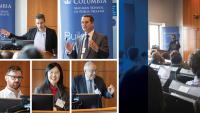Daniel Malinsky, PhD
- Assistant Professor of Biostatistics
On the web

Overview
Daniel Malinsky's methodological research focuses mostly on causal inference: developing statistical methods and machine learning tools to support inference about the consequences of (e.g.) medical decisions, environmental & social exposures, and policies. Current research topics include graphical structure learning (a.k.a. causal discovery or causal model selection), mediation analysis, semiparametric inference, time series analysis, and missing data. Application areas of particular interest include environmental determinants of health (especially air pollution) and health disparities. Dr. Malinsky also studies algorithmic fairness: understanding and counteracting the biases introduced by data science tools deployed in socially-impactful settings. Finally, Dr. Malinsky has interests in the philosophy of science and the foundations of statistics.
Dr. Malinsky is partially supported by K25 career development award from the National Institute of Environmental Health Sciences (NIEHS).
Academic Appointments
- Assistant Professor of Biostatistics
Credentials & Experience
Education & Training
- BA, 2011 Columbia University
- MS, 2015 Carnegie Mellon University
- PhD, 2017 Carnegie Mellon University
Honors & Awards
- 2021: Calderone Health Equity Award (Columbia Mailman School of Public Health)
Research
Research Interests
- Air Pollution
- Algorithmic Fairness
- Artificial Intelligence (AI)
- Biostatistical Methods
- Causal Discovery
- Causal Inference
- Graphical Models
- Health Disparities
- Machine Learning (ML)
- Missing Data
- Social determinants of health
Grants
Present Grants
K25 ES034064-01 NIH / NIEHS (PI: Malinsky)
Flexible causal inference methods for estimating longitudinal effects of air pollution on chronic lung disease
Selected Publications
J.M. Chen, D. Malinsky, R. Bhattacharya (2023) “Causal Inference With Outcome-Dependent Missingness and Self-Censoring." In Proceedings of the 39th Conference on Uncertainty in Artificial Intelligence (UAI).
J.J.R. Lee, R. Srinivasan, C.S. Ong, D. Alejo, S. Schena, I. Shpitser, M. Sussman, G.J.R. Whitman, and D. Malinsky (2023) “Causal determinants of postoperative length of stay in cardiac surgery using causal graphical learning." Journal of Thoracic and Cardiovascular Surgery 166(5): e446-e462.
D. Malinsky, I. Shpitser, and E.J. Tchetgen Tchetgen (2022) “Semiparametric Inference for Non-monotone Missing-Not-at-Random Data: the No Self-Censoring Model.” Journal of the American Statistical Association 117(539): 1415–1423.
R. Bhattacharya, T. Nagarajan, D. Malinsky, and I. Shpitser (2021) “Differentiable Causal Structure Learning Under Unmeasured Confounding.” In Proceedings of the 23rd International Conference on Artificial Intelligence and Statistics (AISTATS).
R. Bhattacharya, D. Malinsky, and I. Shpitser (2019) “Causal Inference Under Interference and Network Uncertainty.” In Proceedings of the 35th Conference on Uncertainty in Artificial Intelligence (UAI).
R. Nabi, D. Malinsky, and I. Shpitser (2019) “Learning Optimal Fair Policies.” In Proceedings of the 36th International Conference on Machine Learning (ICML).
D. Malinsky, I. Shpitser, and T.S. Richardson (2019) “A Potential Outcomes Calculus for Identifying Conditional Path-Specific Effects.” In Proceedings of the 22nd International Conference on Artificial Intelligence and Statistics (AISTATS).
D. Malinsky and P. Spirtes (2019) “Learning the Structure of a Nonstationary Vector Autoregression.” In Proceedings of the 22nd International Conference on Artificial Intelligence and Statistics (AISTATS).
S.W. Mogensen, D. Malinsky, and N.R. Hansen (2018) “Causal Learning for Partially Observed Stochastic Dynamical Systems.” In Proceedings of the 34th Conference on Uncertainty in Artificial Intelligence (UAI).


